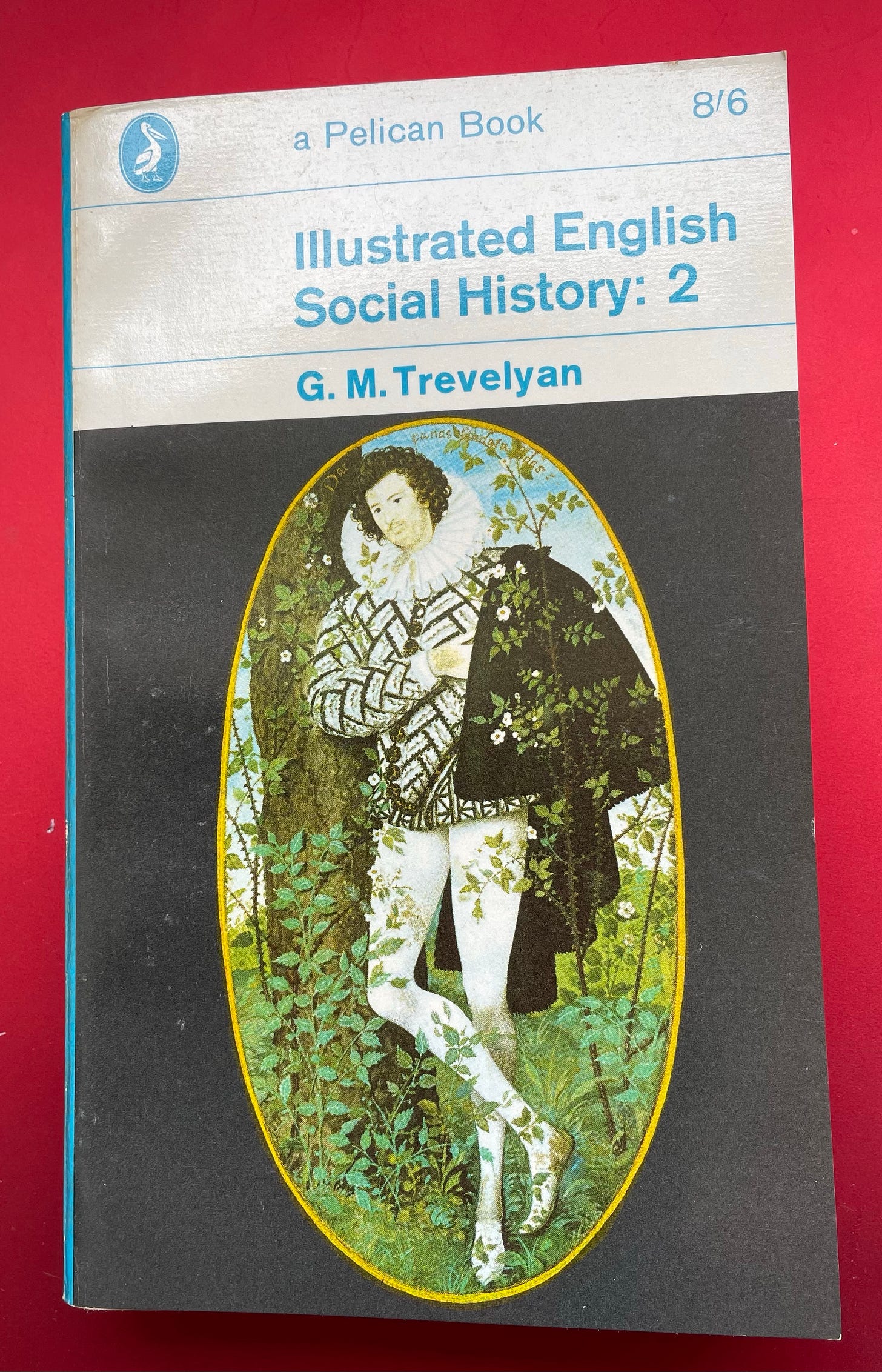Echoes of history
I read a lot of history and historical fiction, and I also read novels that were right up to the minute at the time but were written long ago. Sometimes the whole thing seems wonderfully alien or exotic (the past is a foreign country, etc) but now and then there are such chimes with the present that it makes you glad you read the thing now and not, say, fifteen years ago.
I had two such moments in the last few weeks, reading a fabulous social history and also a nineteenth-century French novel.
GM Trevelyan's illustrated English Social History is well worth digging out, incidentally, if you like Ian Mortimer's Time Traveller's Guides and could stand a more formal and detailed version. Originally from the early 1940s, I believe, the illustrated edition was put together a few years later (I've got the 1960s paperbacks in 4 volumes). It is crammed with maps, paintings, woodcuts and manuscripts from the time in question, plus photographs of surviving artefacts and architecture that might help to make the point. Unfortunately the pictures are all black and white except on the cover, but they do help you imagine the period.
Anyway, the point in question in Trevelyan volume 2 was about what you might call levelling up, and the disproportionate amount of land used for raising livestock for meat. Queen Elizabeth (reigned 1558-1603) passed laws dictating Fish Days - days when you couldn't eat meat and were encouraged to eat fish instead. It sounds superficially Catholic but Elizabeth was very much anti-Catholic and it was in fact to give a boost to fishermen, revive 'decayed coast towns' and 'prevent the too great consumption of beef and mutton which resulted in the conversion of arable into pasture'. She was particularly reliant on the Royal Navy which her father had set up, and the sailors usually came from fishing communities so it makes sense that she wanted a ready supply, which she wouldn't get if everyone gave up on fishing. It was the revival of coastal towns and the limiting of meat livestock that struck me though.
We actually have a Department for Levelling Up, Housing and Communities in the UK government at the moment, and as well as the north-south divide one of the problems I think it's supposed to be addressing is coastal towns, which have tended to be left out and left behind. I'm not clear on why they were decaying in the last Elizabethan period but back then it can't have been anything to do with cheap package holidays luring holiday-makers abroad. Likewise the limiting of meat wasn't related to the present-day concerns of climate change and deforestation but the realisation that you could feed more people using the land for growing crops than grazing animals does echo modern thinking (George Monbiot wrote an article decrying beef and lamb only last week). Recent campaigns to reduce the consumption of red meat would be familiar to Elizabethans even if the idea of veganism wouldn't. I'm not suggesting the government starts decreeing Fish Days but it's interesting to note that there's a Golden Age they could hark back to when state intervention to prop up a faltering but necessary industry or address a problem with national implications was acceptable.
The other book I've been reading was The Ladies Paradise by Emile Zola (Au Bonheur des Dames was the title in the original French), first published in 1883 but set in the 1870s as far as I'm aware. I'd written it on my To Read list a few months ago after reading about it somewhere, but by the time I came to read it I couldn't remember why. Once I got going I wondered if it had come up online in a discussion about Amazon, and other giants of retail.
The novel itself has a romantic tale at its core that sometimes seems a bit of an afterthought (it was apparently adapted for TV by the BBC about 10 years ago, as The Paradise). However, the main business of the book is the owner, the staff, and the running of the Parisian department store The Ladies Paradise, and the effect it has on the shops and shop-owners in the neighbourhood. As the business grows, it stops specialising in dress fabric and broadens its interest into lace, haberdashery, hosiery, even umbrellas and gloves - anything a woman of fashion (or her children) might want. Consequently the local shops, each with its own niche that has been replaced by a department in The Ladies Paradise, are closing down and leaving an impoverished neighbourhood and less choice.
There are arguments in the book about progress and modernisation, about the convenience and cheap prices for customers, about no small shop 'deserving' to stay - they need to adapt or die. All of this is so familiar, particularly in the realm of bookshops but also any small shops that have been struggling in the past couple of years as people speed up their move to online buying or stick to the big superstores rather than use several local shops. It was fascinating in its detail of the day to day running of the department store, but when you read about the 35 clerks employed to work out sales commission (replaced by a spreadsheet or small database now?), the 350 messengers (replaced by phones and then email), the stable hands for the 145 horses for the delivery vans (done away with entirely), you realise that every phase of progress is the future until it isn't. Books from today will no doubt be just as familiar-but-different to readers in 150 years, living through an era we can't imagine.
If I've helped you find a good book to read, or made you think, you can always buy me a cuppa at https://ko-fi.com/jysaville





